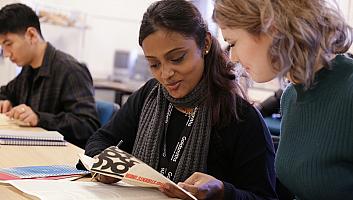BA (Hons) English
Content navigation menu
Why study BA English at Goldsmiths
Bold, flexible, and richly diverse – our BA English degree will take you on a thrilling intellectual and imaginative journey.
-
We ask big questions. We challenge you to read literature in all its cultural, artistic, and political contexts and you will engage in debates about what it means to be human across time.
-
We are diverse. You will travel across histories, cultures and languages, and explore evolving genres such as epic, tragedy and the novel. You will learn about the history of British literature, explore theoretical approaches such as feminism and postcolonialism, and investigate literary engagements with the Transatlantic slave trade, climate change, and political activism. You will be able to study American literature, Black British literature, Caribbean writing and indigenous literatures.
-
We are critical and creative. Our staff undertake cutting edge research in the fields of gender studies; environmental humanities; Caribbean literature; linguistics; Shakespeare studies; American studies, translation studies; contemporary literature; life writing; Decadence; trauma studies; critical theory; modernism; visual culture; Romantic and Victorian literature; and the novel. Home to the Goldsmiths Prize and the Goldsmiths Writers' Centre, the Centre for Comparative Literature, the Centre for Caribbean and Diaspora Studies, and the Decadence Research Centre, Goldsmiths English is at the forefront of critical and creative practice.
-
We are relevant. Our research-led teaching is informed by current debates about canon formation, decolonisation, the role of the arts in cultural and political life and the politics of the archive.
-
We help you succeed. We will help you to grow and develop as a critical thinker and writer. You will have the opportunity to submit drafts of your work for in-term feedback and attend 1-2-1 Effective Academic Writing sessions.
Contact
If you have specific questions about the degree, contact Dr Abigail Shinn.
UCAS code
Q300
Entry requirements
A-level: CCC
BTEC: DMM
IB: 27 points overall with three HL subjects at 555
Length
3 years full-time or 6 years part-time
Fees
Home - full-time: £TBC
Home - part-time: £TBC
International - full-time: £22000
School
Subject
Watch videos about your course
What you'll study
Compulsory modules
In your first year, core modules will introduce you to a wide range of genres and historical literatures, this will provide important groundwork that will inform your later module choices.
You will study canonical literary texts alongside voices outside the cultural mainstream.
Writers typically studied range from Shakespeare, Chaucer and Homer to Bernardine Evaristo, James Baldwin and Maggie Nelson.
Questions of gender, class, race and ethnicity will form an integral part of your syllabus.
We take an expansive view of the literary and students study a range of genres and critical approaches including the novel, poetry, drama, fairy tale, life writing, the short story, speculative fiction, the graphic novel, postcolonialism, historicism, aesthetics and structuralism.
Our approach to learning, teaching and research is probing, inventive and rigorous. As a small and friendly community, first-year students soon get to know many of our core academic staff.
Full-time students take the following compulsory modules:
| Module title | Credits |
|---|---|
| Explorations in Literature | 30 credits |
| Approaches to Text | 30 credits |
| Genre | 30 credits |
| Ideas in Practice | 15 credits |
| Creative-Critical Project | 15 credits |
Note about optional modules (if available): The above is indicative of the typical modules offered, but is not intended to be construed or relied on as a definitive list of what might be available in any given year. The module content and availability is subject to change.
Teaching style
This programme is taught through a mixture of scheduled learning - lectures, seminars and workshops. You’ll also be expected to undertake a significant amount of independent study. This includes carrying out required and additional reading, preparing topics for discussion, and producing essays or project work.
How you'll be assessed
You’ll be assessed by a variety of methods, depending on your module choices. These may include coursework, examinations, group work and projects.
Entry requirements
We accept the following qualifications:
A-level: CCC
BTEC: DMM
International Baccalaureate: 27 points overall with three HL subjects at 555
UAL Extended Diploma: Merit overall
Access: Pass with 45 Level 3 credits including 24 Distinctions and a number of merits/passes in subject-specific modules
Scottish qualifications: CCCCD (Higher) or DDD (Advanced Higher)
European Baccalaureate: 65%
Irish Leaving Certificate: H3 H3 H3 H3
Additional entry requirements
To study this programme, a Grade C in A-level English Literature/A-Level English Language and Literature/A-level English Language is required if you have studied A-Levels.
Alternatively, an equivalent English subject will be accepted e.g. Grade 5 in IB Higher Level English.
Alternative qualifications
See our full list of undergraduate entry qualifications.
We welcome students with a range of educational experiences. If you believe you may not meet the standard qualification requirements we would still encourage you to apply because we consider all aspects of your application when making a decision.
We’ll pay particularly careful attention to your personal statement, which is your opportunity to demonstrate your interest in the subject you’ve applied for. Your referees are also welcome to include any relevant contextual comments around your academic achievements. We’ll look at all these things when making a decision on your application, as well as your qualifications and grades.
We also offer this programme as an Integrated Degree in English, where you will complete a foundation year before progressing on to the undergraduate degree. Progression on to the BA in English requires you to successfully pass the foundation year.
International qualifications
We also accept a wide range of international qualifications. Find out more about the qualifications we accept from around the world.
If English isn’t your first language, you will need an IELTS score (or equivalent English language qualification) of 6.5 with a 6.5 in writing and no element lower than 6.0 to study this programme. If you need assistance with your English language, we offer a range of courses that can help prepare you for degree-level study.
Fees and funding
Annual tuition fees
These are the UG fees for students starting their programme in the 2025/2026 academic year.
- Home - full-time: £TBC
- Home - part-time: £TBC
- International - full-time: £22000
If your fees are not listed here, please check our undergraduate fees guidance or contact the Fees Office, who can also advise you about how to pay your fees.
It’s not currently possible for international students to study part-time if you require a Student Visa, however this is currently being reviewed and will be confirmed in the new year. Please read our visa guidance in the interim for more information. If you think you might be eligible to study part-time while being on another visa type, please contact our Admissions Team for more information.
If you are looking to pay your fees please see our guide to making a payment.
Funding opportunities
We offer a wide range of scholarships and bursaries, and our careers service can also offer advice on finding work during your studies. Find out more about funding your studies with us.
Additional costs
In addition to your tuition fees, you'll be responsible for any additional costs associated with your course, such as buying stationery and paying for photocopying. You can find out more about what you need to budget for on our study costs page.
There may also be specific additional costs associated with your programme. This can include things like paying for field trips or specialist materials for your assignments. Please check the programme specification for more information.
What our students say



Careers
Getting you ready for work
Our graduates have a good employment record. Professions include:
- Publishing
- Journalism
- Public Relations
- Teaching
- Advertising
- Civil service
- Personnel
You can find out more about the career options available to you after you graduate on our English careers page.
Placements
You can choose to take a work placement module as one of your option modules in your second or third year. This module allows you to undertake a work placement which will benefit your studies, your skillset and your CV.
Find out more about we help you improve your employability while at Goldsmiths
Skills
You will learn to solve problems, to think critically and creatively, and to communicate with clarity.
This degree opens up a wide range of careers by developing your:
- Critical and analytical skills
- Proficiency in assessing evidence
- Clear expression of ideas
- Ability to bring together insights from a range of subjects
All of these are attractive to a variety of employers.



